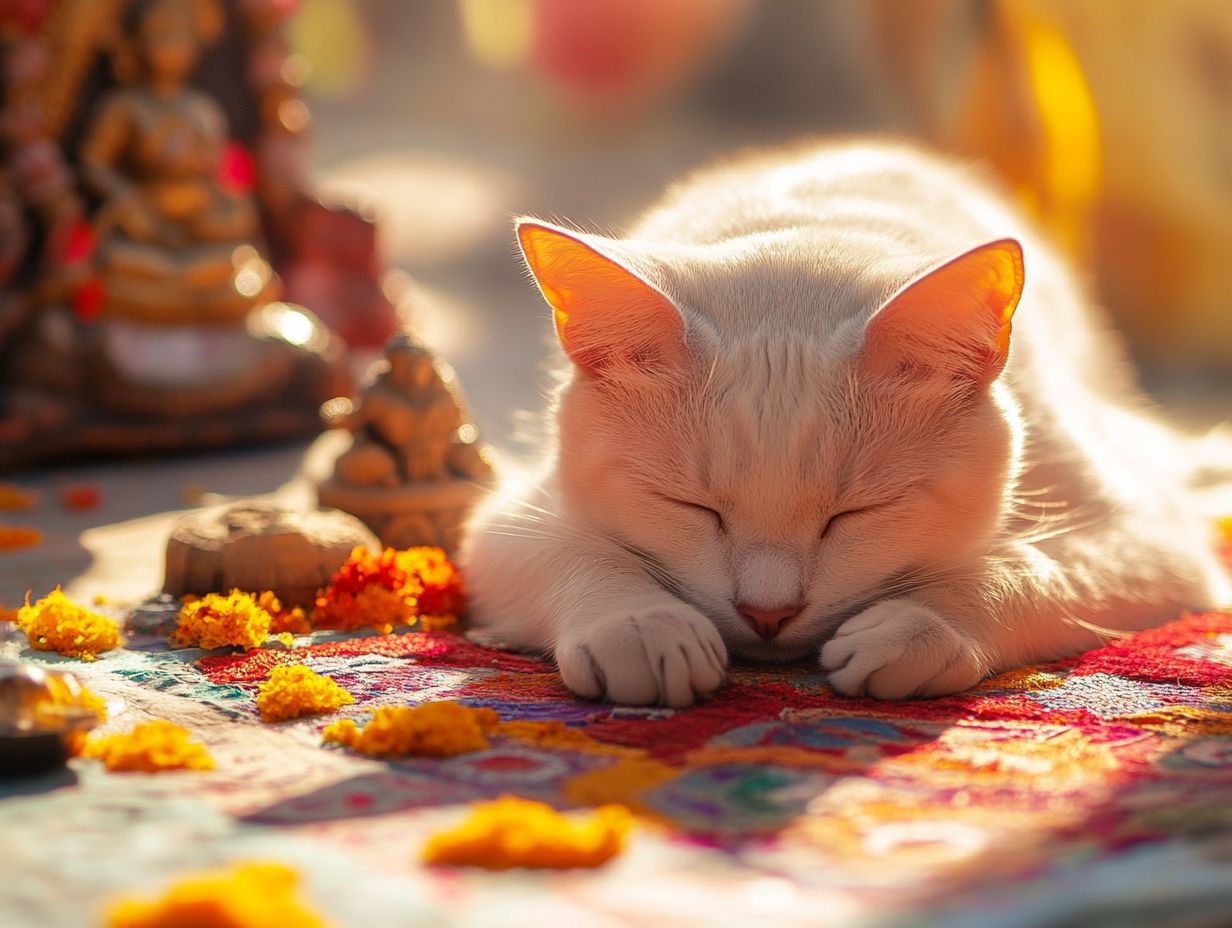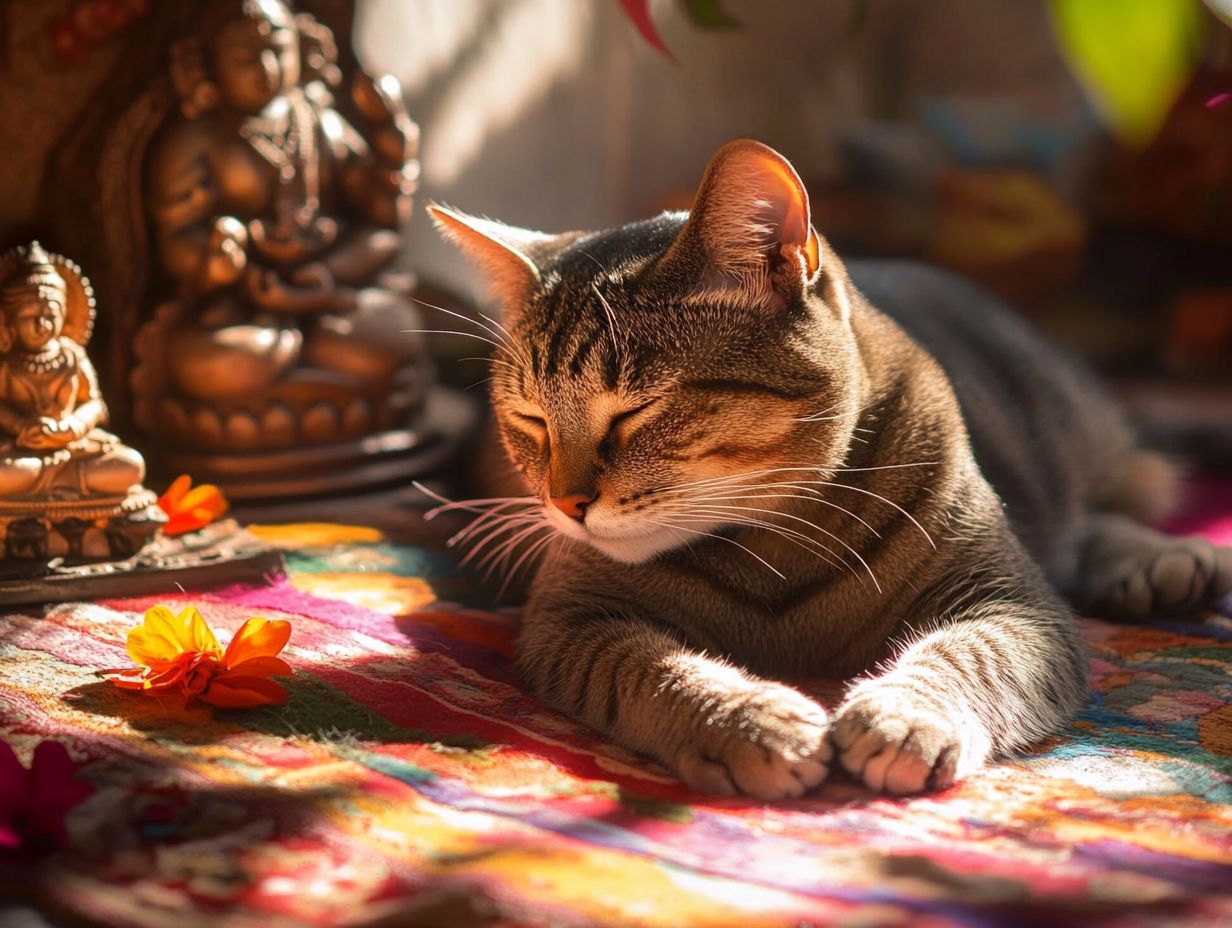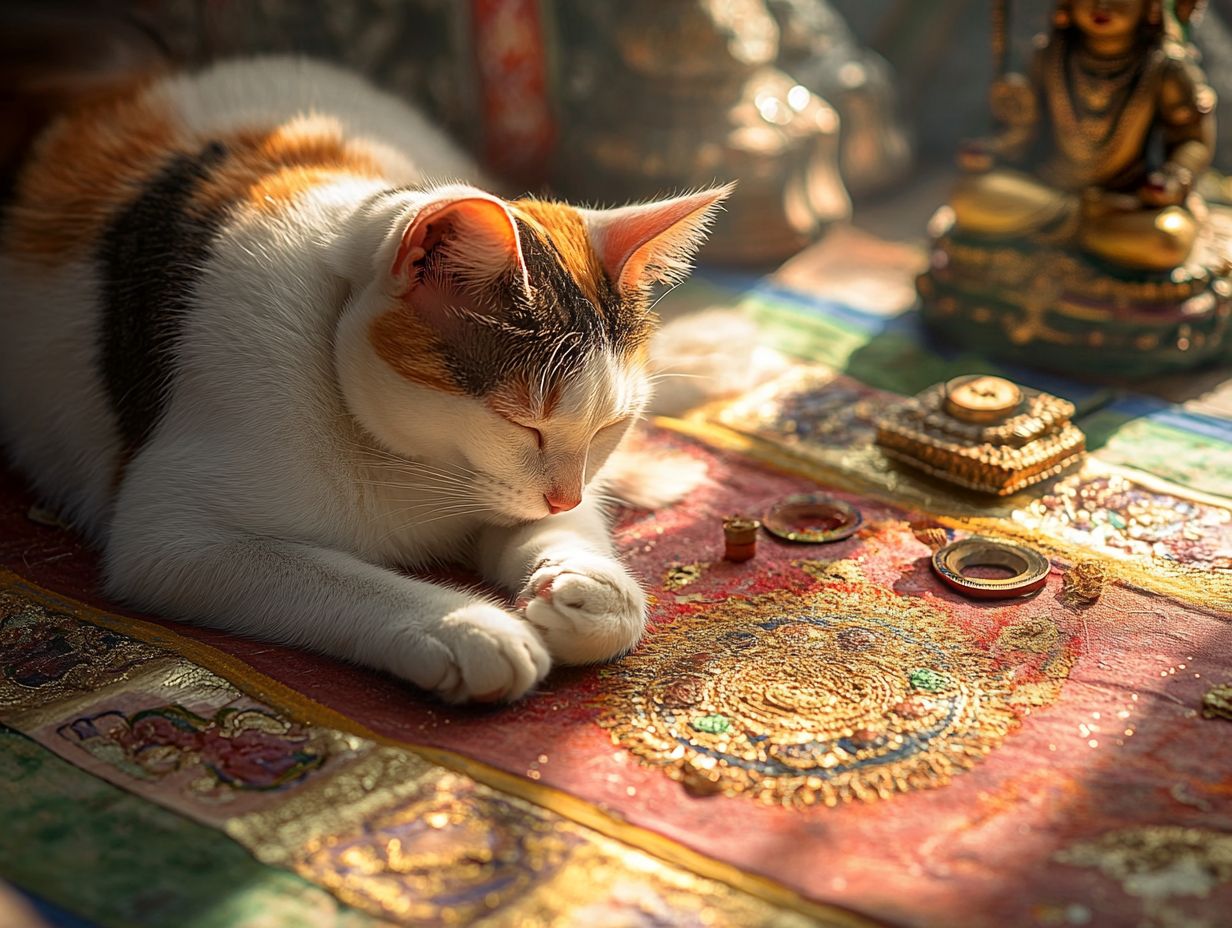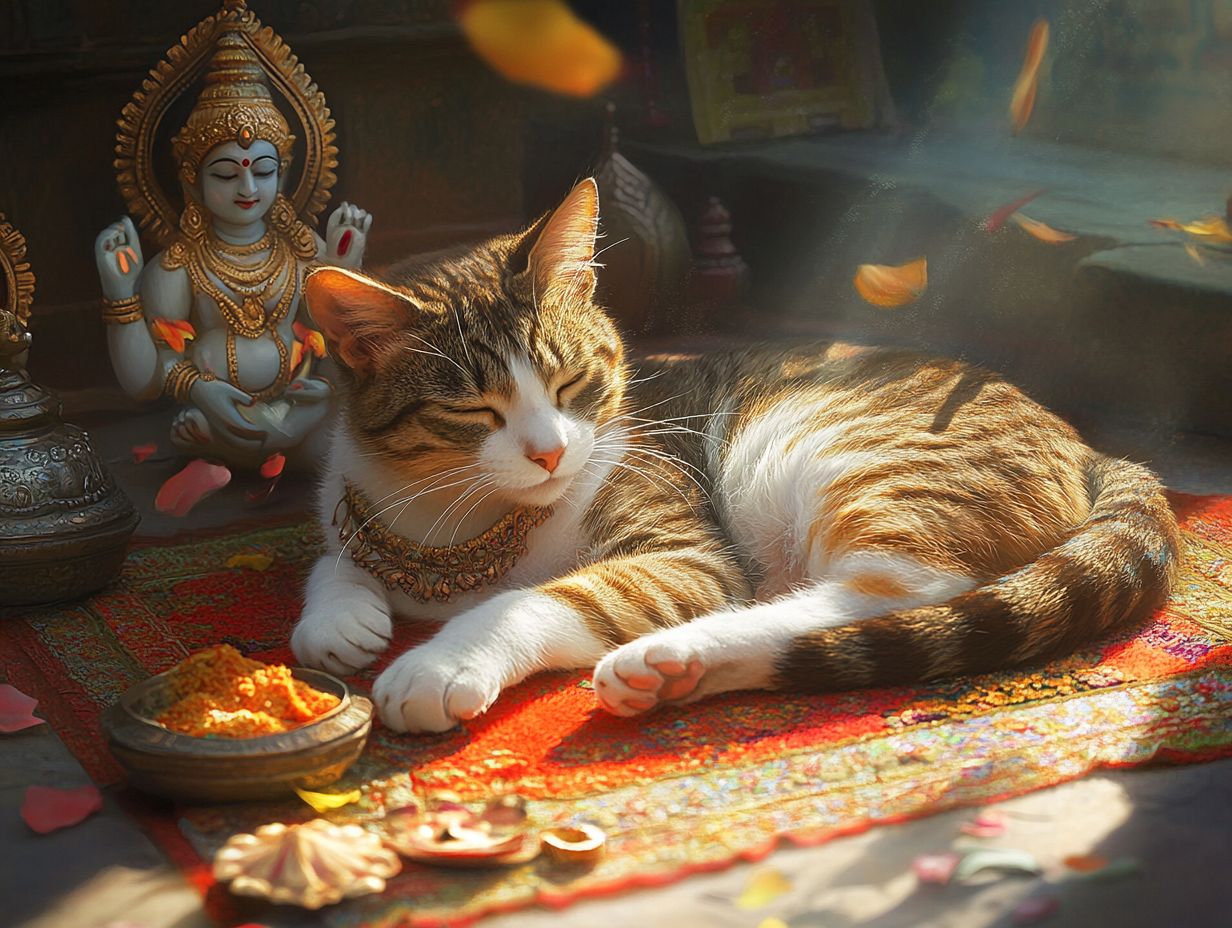What Does Hinduism Say About Cats?
Hinduism, recognized as one of the world’s oldest religions, possesses a profound tapestry of history, beliefs, and practices that influence the worldview of its adherents. Within this intricate framework, the significance of animals, with a particular emphasis on cats as sacred animals, occupies a distinctive position.
This article delves into the historical roots of Hinduism, articulating its foundational beliefs and highlighting the essential role that animals play in its rich mythology and rituals. By exploring the symbolism of cats, their representation in narratives and legends, as well as their treatment in both Hindu culture and the legal frameworks of India, it unveils the profound connections between spirituality, household pets, and the cherished feline companions that many hold dear.
What is the History of Hinduism?

Hinduism, recognized as one of the oldest religions in the world, boasts a rich and intricate history that spans millennia, evolving through a myriad of cultural and spiritual influences throughout the Indian subcontinent. This venerable faith is firmly rooted in ancient scriptures known as the Vedas and Puranas, which delineate its sacred beliefs, deities, and rituals, forming a foundation for spiritual practices and cultural identities that profoundly shape the lives of millions today.
Throughout the centuries, Hinduism has embraced a diverse array of philosophies and traditions, including the revered epics of the Ramayana and Mahabharata, which offer moral guidance and deep insights into dharma the essential concept of duty and righteousness. Influential figures, such as Adi Shankaracharya, have played pivotal roles in the development of significant philosophical schools, notably Advaita Vedanta, which underscores the unity of the individual soul with the Supreme. The Upanishads, another set of ancient scriptures, provide profound philosophical teachings that delve into the nature of reality and the self.
The religion’s remarkable adaptability has allowed it to integrate various regional customs and beliefs, reflecting a vibrant tapestry of cultural heritage. Consequently, Hinduism transcends mere doctrine; it stands as a living, breathing tradition that continues to inspire devotion and inquiry among its practitioners.
What are the Core Beliefs of Hinduism?
The core beliefs of Hinduism encompass a rich tapestry of principles that delineate the spiritual and ethical framework of this intricate religion. Key concepts such as karma, dharma, and reincarnation serve as foundational elements, emphasizing the paramount importance of respect, compassion, and spiritual growth. Ultimately, these beliefs guide individuals toward enlightenment and foster a deeper understanding of the universe.
Karma, often interpreted as the law of cause and effect, plays a crucial role in shaping one’s destiny. It encourages adherents to engage thoughtfully and ethically in every facet of life. Dharma, on the other hand, refers to the moral duties and responsibilities individuals hold based on their age, caste, and social standing, thereby promoting a sense of order and harmony within society.
Reincarnation presents a profound perspective on the cycle of life, compelling individuals to lead virtuous lives in pursuit of a more favorable rebirth. By adhering to these principles, individuals not only enhance their own spiritual journeys but also contribute positively to the collective well-being of the world around them.
The Importance of Animals in Hinduism
Animals hold a prominent position within Hinduism, embodying the religion’s profound spirituality and unwavering dedication to ahimsa, or non-violence. This reverence for animals is intricately woven into cultural practices, beliefs, and rituals, underscoring their status as sacred beings that represent various deities or act as guardians of spiritual values. From the sacred cow to the revered cat, these animals symbolize the divine connection and spiritual well-being that permeate Hindu beliefs and practices.
In this way, animals significantly enhance the relationship between humans and the divine, enriching the spiritual landscape of the faith.
What is the Hindu Perspective on Animals?
The Hindu perspective on animals is marked by a deep-seated respect and compassion for all living beings, grounded in the conviction that every creature possesses a spark of the divine. This ethical viewpoint emphasizes animal rights and welfare, highlighting the belief that humans bear a responsibility to protect and nurture animals as essential components of both the ecosystem and spiritual stewardship. In particular, the protection of animals through practices like vegetarianism is seen as a form of devotion and spiritual growth, aligning with the broader principles of Hindu ethics and morality.
Philosophical texts such as the Bhagavad Gita and the writings of various saints illuminate the intrinsic value of all life forms. Practices like Ahimsa, or non-violence, further reinforce this ethos, advocating for the humane treatment of animals and promoting their well-being. Culturally, festivals and rituals frequently celebrate the bonds between humans and animals, reflecting a commitment to guardianship rather than dominion. Popular Hindu festivals, such as Diwali and Holi, often include rituals that honor household pets and other animals, showcasing their pivotal role in family and spiritual life.
These beliefs are often manifested in the prevalence of vegetarianism among many Hindus, underscoring the idea that respect for animals constitutes not only a moral obligation but also a pathway to spiritual growth and harmony with the universe. Additionally, the practice of karma yoga, or selfless action, in caring for animals further exemplifies the deep spiritual and ethical commitments that guide Hindu life.
What are the Roles of Animals in Hindu Mythology?
In Hindu mythology, animals play crucial roles as symbols of divine attributes and companions to deities, embodying various dimensions of spirituality and the cosmic order. From the elegant swan associated with the goddess Saraswati to the formidable tiger often portrayed alongside goddess Durga, these creatures epitomize the profound connection between the natural world and spiritual enlightenment. The revered Lord Shiva is often depicted with Nandi, the sacred bull, signifying strength and loyalty.
The elephant-headed deity Ganesha, for instance, rides a mouse, a poignant representation of how faith can triumph over even the most insignificant obstacles. Similarly, the serpent Ananta embodies eternity and cosmic balance, frequently depicted surrounding Lord Vishnu, which underscores the intricate interconnectedness of all life. Additionally, the feline symbolism in relation to household deities and guardian spirits further illustrates the spiritual significance of animals within Hindu traditions.
Each animal not only enriches the narratives of the deities but also imparts deeper messages regarding the harmony between human existence and nature, serving as a reminder to devotees of the importance of respecting every creature as an integral part of the divine tapestry.
Cats in Hinduism

Cats occupy a distinctive and fascinating role within Hinduism, often celebrated as spiritual beings that embody a range of symbols, including strength, independence, and enigma.
Their significance in folklore and mythology reveals deep-rooted beliefs about their divine qualities, with instances where they are linked to specific deities or regarded as guardians of the home.
This reverence adds a rich layer to the cultural tapestry in which these enigmatic creatures are cherished.
What is the Symbolism of Cats in Hinduism?
In Hinduism, the symbolism of cats is intricately woven into the spiritual tapestry, embodying themes of independence, protection, and the enigmatic nature of life. These graceful companions are often regarded as manifestations of divine attributes associated with various deities, serving not only as symbols of agility but also as guardians of the home, shielding against negative influences.
Cats find their place in a myriad of mythological narratives, notably their connection to the goddess Shasti, who is venerated for her role in safeguarding mothers and children. Their mere presence is thought to repel malevolent spirits, reinforcing the belief that these creatures possess protective powers within domestic realms.
In certain rural traditions, the appearance of a cat crossing one’s path is interpreted as a significant omen, signaling a protective shield against misfortune. This rich and multifaceted representation underscores the complex role that cats occupy in both the spiritual and everyday lives of devotees, illustrating their esteemed status within the cultural fabric. These cats are often considered to be guardian spirits, offering divine protection and spiritual guidance.
What are the Stories and Legends Involving Cats in Hinduism?
Stories and legends involving cats in Hinduism intricately reflect the qualities and attributes of these fascinating creatures, illuminating their significance within the cultural fabric of the religion. From narratives that showcase their cunning nature to those that depict their role as protectors, these tales reveal the profound connection between cats and the spiritual realm. Puranic stories often describe cats as transcendental beings, embodying the sacredness of life and the mysteries of the universe.
As custodians of balance in both nature and domestic spaces, these feline figures exemplify a wisdom and independence that captivates the human imagination. In various folktales, the cat emerges as a symbol of resilience and mystery, embodying themes such as loyalty, transformation, and guardianship. Their presence often intertwines with notions of both good fortune and mischief, emphasizing the dualities that define existence. The rich folklore traditions of Hinduism often portray cats as spiritual guides, aiding humans in their life cycles and spiritual journeys.
Through the exploration of these stories, one can not only appreciate the cultural significance of cats but also glean the morals they impart, enriching the tapestry of Hindu folklore with profound layers of meaning and spirituality. The lessons from these narratives often emphasize the values of love, respect, and nurturing, which are central to Hindu ethics and spiritual practice.
Cats in Hindu Rituals and Practices
Cats frequently find a place in Hindu rituals and practices, embodying the symbols of protection and spiritual well-being within the home. Their involvement in specific ceremonies and offerings underscores the belief in their guardianship, promoting auspiciousness and harmony in domestic life. These rituals associated with cats often highlight their role as family deities and protectors, symbolizing divine protection and spiritual well-being.
This integration not only enhances the sanctity of the rituals but also reinforces the profound bond between humans and these esteemed creatures.
What are the Rituals and Practices Involving Cats in Hinduism?
Rituals and practices involving cats in Hinduism often encompass offerings and blessings intended for their well-being, reflecting a profound spiritual connection between humans and their feline companions. These rituals may include special puja dedicated to cats, underscoring their role as protectors and their ability to generate positive energy within the household.
In numerous households, it is customary to place cat food and milk as offerings on auspicious days, signifying the reverence bestowed upon these creatures. Devotees believe that cats possess mystical qualities capable of warding off negative energies, rendering their presence invaluable.
Such rituals may involve chanting mantras or reciting specific prayers, believed to invoke the blessings of feline deities. These practices not only pay homage to the animal but also foster a harmonious environment, reinforcing the belief that cats serve as guardians of the household, aligning spiritual energies and promoting overall peace and well-being.
How are Cats Treated in Hindu Culture?

In Hindu culture, cats are held in high esteem, treated with both respect and care. They are often seen as companions that enhance household harmony and spiritual well-being. This treatment reflects the deep-rooted values of compassion and protection inherent in Hindu beliefs, with many households embracing these feline beings as cherished family members.
The reverence for cats extends to various rituals and practices that honor these animals, recognizing them not merely as pets but as symbols of good fortune and prosperity. Families frequently provide special diets for their cats, ensuring they receive nutritious meals tailored to their needs. Some even incorporate their feline companions into daily spiritual practices, offering them treats during pujas.
Such actions exemplify the Hindu principle of treating all living beings with dignity and kindness, reinforcing the notion that every creature deserves love and protection within the home.
The Influence of Hinduism on the Treatment of Cats in India
Hinduism plays a pivotal role in shaping the treatment of cats in India, where cultural practices and spiritual beliefs profoundly influence the perception and care of these animals in households. The principles of ahimsa, or non-violence, along with a deep reverence for all living beings, foster a nurturing and protective environment for cats.
This cultural ethos ensures their welfare and well-being, reflecting the integral place these animals hold within society.
How Does Hinduism Affect the Treatment of Cats in India Today?
Today, Hinduism profoundly influences the treatment of cats in India, as numerous individuals and communities champion animal rights and welfare in alignment with spiritual teachings. This evolving perspective fosters responsible pet ownership and a deep-seated commitment to the care of domestic cats, thereby promoting a harmonious coexistence with these cherished companions.
In a society where sacred beliefs seamlessly intertwine with everyday practices, the treatment of these felines serves as a reflection of broader values rooted in compassion and respect for all living beings. Many devotees regard animals as manifestations of divine qualities, leading to an increasing recognition of the imperative to provide shelter, nourishment, and medical care to stray and abandoned cats.
Community initiatives, often inspired by ancient philosophies, endeavor to educate the public on spaying and neutering, as well as humane methods of population control. These efforts cultivate a culture of empathy and responsibility toward these animals that grace both homes and streets, highlighting the intrinsic value of all living creatures.
What are the Laws and Regulations Protecting Cats in India?
In India, a robust framework of laws and regulations has been instituted to safeguard the welfare of cats, underscoring their significance in both cultural and spiritual realms. These legal measures are designed to ensure humane treatment and to prevent cruelty towards domestic felines, fostering a society that genuinely values their well-being.
Prominent among these is the Prevention of Cruelty to Animals Act of 1960, a pivotal piece of legislation that delineates specific offenses and corresponding penalties related to the mistreatment of animals. The Animal Welfare Board of India plays an instrumental role in advising the government on matters affecting cats, thereby advocating for their rights and promoting responsible ownership.
Plus national laws, local municipal regulations further contribute to the welfare of cats by establishing standards for sterilization and vaccination programs aimed at controlling feral cat populations in a humane manner. Such comprehensive initiatives not only enhance the quality of life for these beloved animals but also serve to educate the public about their responsibilities, ultimately fostering a more compassionate attitude towards cats within society.
Frequently Asked Questions
What Does Hinduism Say About Cats?

In Hinduism, cats are considered sacred animals and are often associated with goddesses such as Durga and Kali.
Are cats worshipped in Hinduism?
Yes, cats are worshipped in Hinduism as they are seen as a form of the divine and are believed to bring good luck and prosperity.
What is the significance of cats in Hinduism?
Cats are believed to possess spiritual powers and are seen as a symbol of protection, fertility, and wisdom.
Do cats have a role in Hindu mythology?
Yes, cats are mentioned in several Hindu mythological stories and are often depicted as companions or vehicles of gods and goddesses.
Is there a specific breed of cats associated with Hinduism?
No, there is no specific breed of cats associated with Hinduism. All cats are seen as divine and are treated with reverence.
Are there any rituals or customs related to cats in Hinduism?
Yes, there are certain rituals and customs related to cats in Hinduism, such as offering prayers and food to stray cats, especially during the festival of Diwali.
